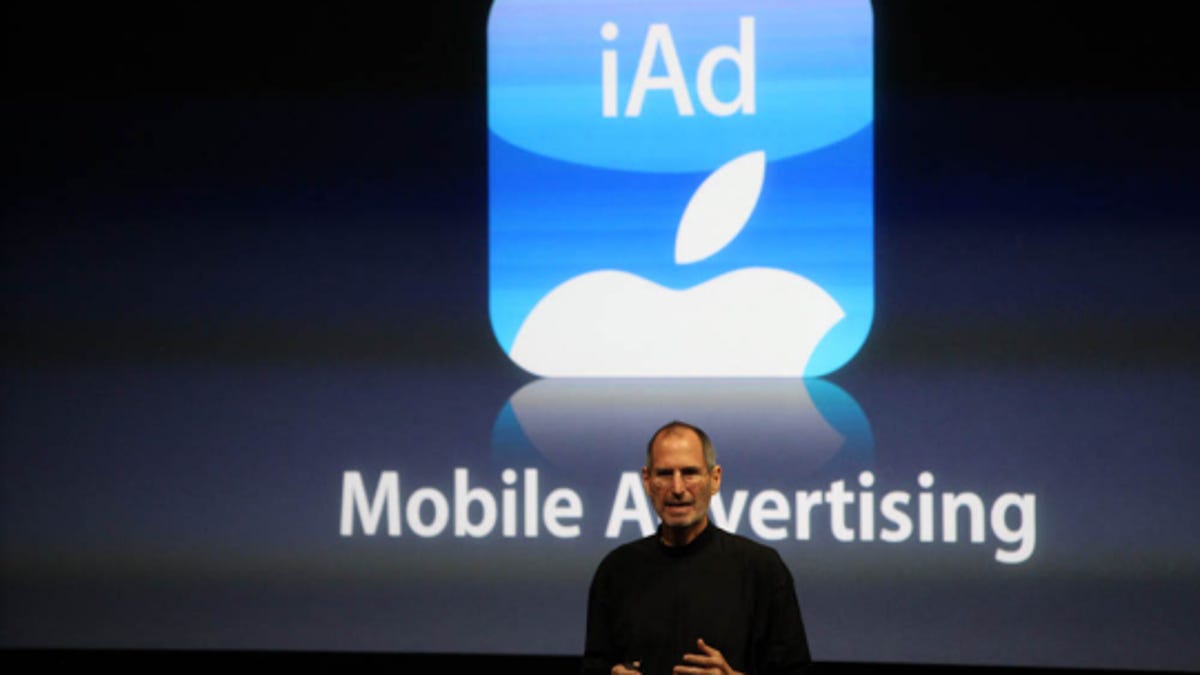Apple strikes back at Google with iAd
For years, Apple has watched former ally Google launch products that compete with Apple. When the iPhone OS 4 arrives, Apple will return the favor with iAd.

Can Apple really out-Google Google?
The growing rancor between Apple and Google has been generally fed by Google's attempt to outdo Apple's iPhone with its Android software. But now Apple is taking aim at Google's bread-and-butter--online advertising--with plans to introduce a mobile advertising platform called iAd along with the release of the iPhone OS 4 software later this summer.
Apple's strategy is to give iPhone developers and corporate marketers a way to incorporate sophisticated and compelling ads in iPhone applications by essentially allowing them to build an application within an application. CEO Steve Jobs demonstrated several ads created using iAd, such as an ad for the upcoming Pixar film "Toy Story 3" that included trailers, games, and other content that could be accessed from a portion of the screen at the bottom of an application.
Users probably aren't going to like it, but developers struggling to build businesses around free iPhone apps will. Corporations looking for better ways to reach potential customers will. And a new breed of firms specializing in marketing services around iAd will.
Google put on a rosy face Thursday. "This is more evidence of how quickly mobile advertising is evolving and growing," it said in a statement primarily intended for theFederal Trade Commission lawyers potentially gearing up to block its $750 million acquisition of AdMob, a company Jobs acknowledged Thursday that Apple also tried to buy.
But this sets up a battleground for how advertising evolves on mobile platforms. Apple is declaring that the best way for marketers to reach mobile users is through iPhone applications, rather than the Web at large. Google and AdMob, on the other hand, are much more focused on ads delivered in the browser on mobile Web pages. And Apple made some compelling arguments Thursday about why its plan could be more effective.
Jobs said that the average iPhone owner spends 30 minutes a day using applications. So there's an awful lot of potential ad impressions at play, but mobile ads inside iPhone apps are even more annoying than desktop ads because should you happen to click on one, you're taken away from the app and into the browser.
iAd will allow marketers to make ads that essentially stay within the app, and that will also allow them to make ads that take advantage of all the features the iPhone operating system can offer. This could potentially be more compelling to users (assuming they aren't cold to the idea of ads in general) and will definitely command premium prices within applications, as compared to Web ads.
It's also a manifestation of Apple's desire to control the entire experience on the iPhone from top to bottom. Ads will likely have to go through some sort of review process, although Jobs indicated that it wouldn't be quite as strict as the app review process itself.
How will Google respond? It could offer something similar within Android applications, although it would be a bit of a departure from Google's desire to offer an open software platform and promote the idea of Web ads and applications as superior to desktop ones.
The problem for Google is that the mobile world is much farther behind the desktop world when it comes to exchanging native apps for Web apps. The iPhone itself is evidence of that: software developers practically demanded native access to the iPhone after Jobs initially tried to convince them to build mobile Safari applications, and those applications have proven to be the most compelling way of interacting with the Internet for iPhone users.
And Google's essential strength--search technology--is not the primary way of discovering new products and services on the mobile device. App stores are that bridge at the moment: AdMob CEO Omar Hamoui recently compared the mobile world to the early days of Yahoo, when its directory-style approach was an effective way of organizing the Internet.
Someday that will likely change, and mobile search is already a significant part of the mobile experience. But until then, iAd will deny Google the ability to provide its huge group of ad partners the most compelling advertising experience on the one of the premier mobile devices on the planet. Even if the AdMob deal goes through and Google is able to sell Web-based ads in iPhone applications, Apple will control the premium experience, and give developers 60 percent of the revenue from iAds.
Apple has stewed for years as it has watched Google encroach on its territory with products like Android, Chrome, and eventually Chrome OS. Thursday, it struck back, and Google's response should be interesting.